

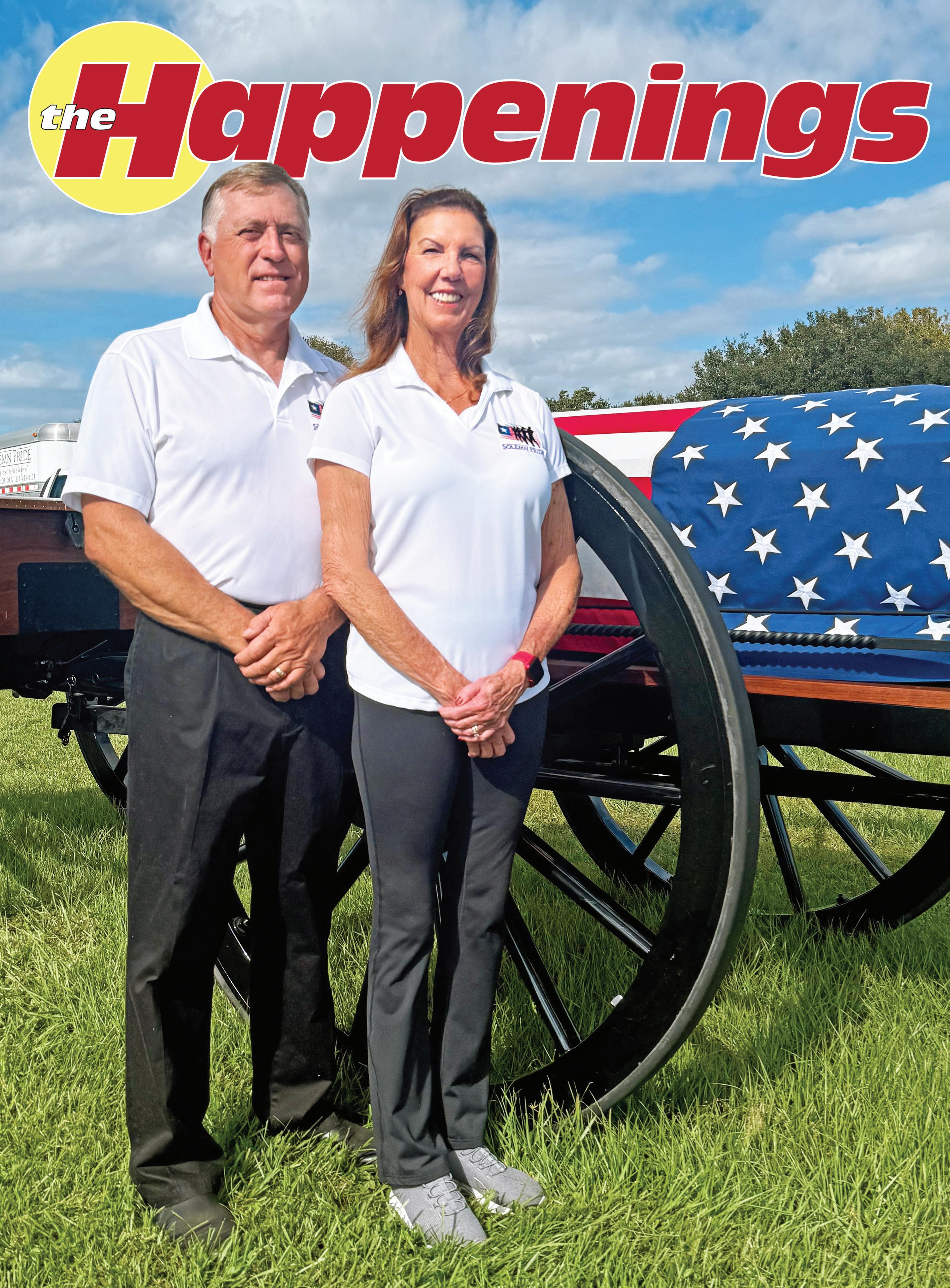






Tom Fitzgerald, a Marine Corps veteran and retired IT Director for the Brevard County School District, has devoted his life to service both on and off duty. From his time in the military and law enforcement to his current volunteer work, Tom combines leadership, discipline, and a deep respect for tradition. Alongside his wife Denise, she channels his passion for honoring veterans into Solemn Pride, providing ceremonial caisson escorts and other meaningful tributes to those who served.
Tom, let’s start at the beginning. Where did you grow up, and what led you into the military?
I was born in Rome, New York, and graduated from Rome Free Academy in 1982. I went straight into the Marine Corps right after high school. I spent four years active duty and two in the reserves, serving first at Camp Pendleton and later in Iwakuni, Japan, as a military policeman. My last year I worked in criminal investigations - a great experience. Was military service a family tradition?
You could say that. My dad served in the Army between Korea and Vietnam, and my brother was also in the Army before becoming a police officer. After my time in the Marines, I followed that path too - joined the Marietta Police Department in Georgia. My brother was a Roswell police officer until he passed at 47 from toxic exposure, much like the Camp Lejeune cases.
What came next after law enforcement?
I moved to Florida, finished my associate’s degree at Seminole Community College, and earned a full scholarship to Florida Tech. Eventually, I worked for the Brevard County School District in information technology, where I retired as IT Director in 2020.
So where do horses - and eventually Solemn Pride - come into the picture?
My wife, Denise, has been around horses since she was fourteen. When we married, she promised me a “kid-safe horse,” and we started trail riding and camping all over the country with our horses for about fifteen years.
When my brother passed in 2011, and soon after Denise’s parents, we felt pulled to do something meaningful. We already owned a pair of mules and a historic caisson we
used for reenactments, so when Cape Canaveral National Cemetery opened just four miles from our farm, it felt like the right way to give back. We volunteered to provide ceremonial caisson escorts for veterans’ funerals.
And that’s how Solemn Pride began?
Exactly. We never set out to create an organization - we just wanted to honor our families and other veterans. But it grew fast. Funeral homes from all over Central Florida started calling. Families were so grateful to have that traditional escort. We never charged what the time or equipment was worth - we’ve always seen it as a way to serve.
What makes the caisson ceremony so special?
It’s about dignity. The sight of the flag-draped casket carried by the team, the sound of hooves - it’s timeless. It transforms something heartbreaking into something proud and honorable.
I understand there’s a new chapter for Solemn Pride. Yes, our two faithful mules have retired after 11 years of service. We recently brought in a pair of rescue horses who are now in training to take their place. It feels right - giving these animals a second chance while they help us continue our mission.
You’re also active with the Cape Canaveral National Cemetery Support Committee, correct?
Yes, I’m currently the vice chair. Our volunteers help with events, outreach, and anything the cemetery staff needsfrom Memorial Day programs to greeting visitors. We try to spread the word that this national cemetery serves five counties, and yet many local residents still don’t know it’s here. What keeps you motivated after all these years of service? Every ceremony reminds us why we do it. Each one represents a life of service and sacrifice. For us, it’s simple - we want to make sure no veteran’s final journey is ever forgotten.

A caisson is more than just a carriage pulled by horses; it is a symbol of honor, respect, and tradition in military funerals. Historically, caissons were used in warfare to transport artillery and ammunition. By the late 19th century, the U.S. Army began adapting them for ceremonial purposes, particularly for the dignified transportation of fallen soldiers. The sight of a caisson carrying a casket, flanked by a military escort, has become one of the most solemn and powerful images of a military funeral, representing the nation’s gratitude and reverence for those who served.
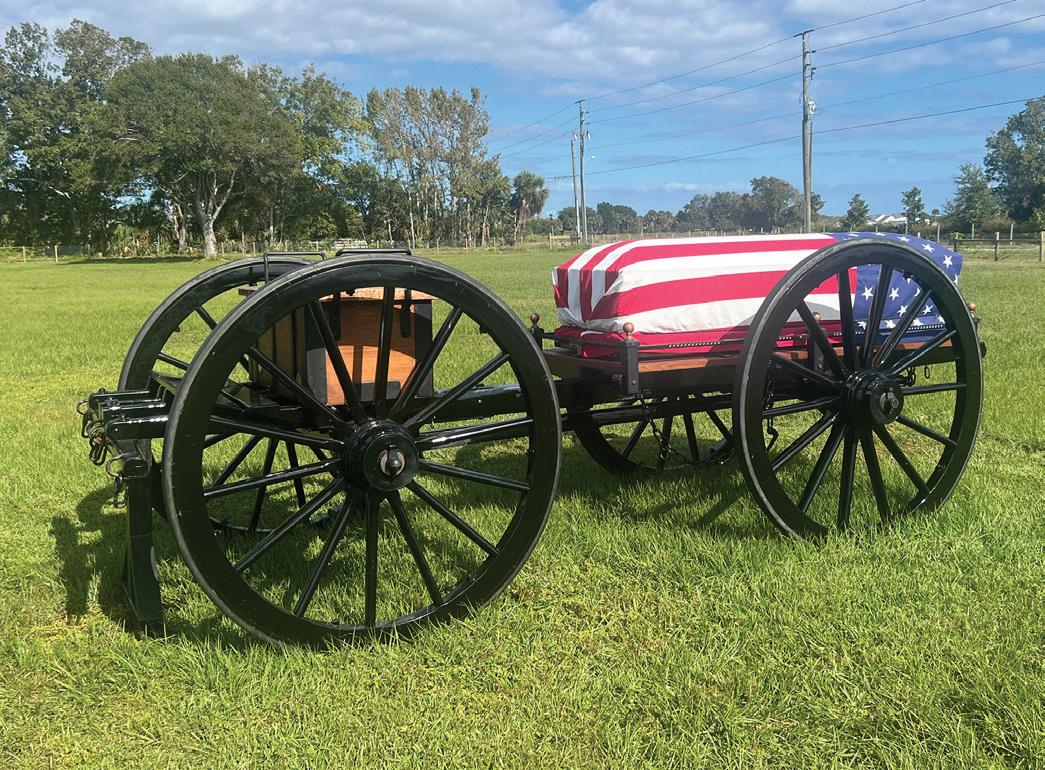
At Arlington National Cemetery and other major military cemeteries, caissons continue to play a central role in state and military funerals. The precision, discipline, and care required to operate them reflect the honor due to each service member. Every movement of the horses, the alignment of the carriage, and the ceremonial escort is steeped in tradition, creating a moment of deep respect for families and attendees alike.
For Tom and Denise Fitzgerald, this tradition is the heart of Solemn Pride. What began as a hobby with their own horses evolved into a volunteer mission to ensure veterans in Florida receive the dignity and honor of a caisson escort at their funerals. Operating caissons is no small undertaking - it requires specialized equipment, extensive training, and unwavering dedication. Tom and Denise have gone above and beyond, transporting their animals, maintaining harnesses and wagons, and coordinating with funeral homes and national cemeteries.
The cause of Solemn Pride extends beyond ceremony. Every funeral they serve represents a personal commitment to preserving history, paying tribute to sacrifice, and giving families a moment of closure steeped in military tradition.

When the flag-draped casket emerges and the world seems to breathe a little slower, there’s a quiet procession that carries more than weight - it carries memory, history, and gratitude.
At Cape Canaveral National Cemetery, that procession is often led by Solemn Pride, a local nonprofit that provides caisson escorts to honor veterans and first responders.
Founded and operated by TGO residents,Tom and Denise Fitzgerald, Solemn Pride has brought dignity and tradition to hundreds of interment services. Their carefully trained teams once featured a pair of beloved mules that drew the caisson - a solemn, horse-drawn carriage used since the Civil War to carry the fallen. When those mules recently “aged out” of service, the Fitzgeralds turned their compassion toward two rescue horses, now being trained to take their place and continue the mission.
“It’s about dignity,” Tom often says. The organization’s mission reflects that belief - to transform the somberness associated with life’s end into prideful memories by honoring veterans and first responders.
For families who choose the caisson escort, the steady rhythm of hooves and the gleam of the harness bring a timeless beauty to the farewell.
Beyond their ceremonial role, the Fitzgeralds volunteer on the cemetery’s support committee and welcome community involvement to sustain their work. The new rescue horses mark both a fresh chapter and a reaffirmation of purpose - ensuring that no veteran’s final journey is without honor.
To learn more about Solemn Pride or support their efforts, visit their website at solemnpride.org or view their Facebook page - Solemn Pride.
Tom, tell us about your work with Flags for the Fallen. What is it, and what do you do?
Flags for the Fallen is a nonprofit program that places small American flags - about 8 by 12 inches - at the headstones of veterans, usually the weekend before Memorial Day. The idea is simple: to never forget a veteran. Volunteers read the names on each headstone as they place the flags, which keeps their memory alive.
How big is the program at Cape Canaveral Cemetery?
Over the past ten years, we’ve placed about 17,000 flags there, and that number grows by 3,000 to 4,000 each year. The cemetery has over 160,000 interment plots - including vaults, urns, and columbarium walls - so there’s plenty of work to do.
How do volunteers get involved?
We typically have two main workdays a year - one to put out the flags and another to take them down. That takes less than two hours each. Volunteers also help maintain the flags: checking for broken staffs, wiping them down, and prepping them for reuse. It’s really satisfying, and any help goes a long way.
How can TGO residents participate?
We’d love to get some TGO volunteers involved. Whether it’s
helping place flags, take them down, or prep them during the year, there’s something for everyone. Even a few hours can make a big difference and ensure veterans are honored properly.
Is Flags for the Fallen a national program?
Yes. While the program had some changes over the years, each national cemetery now carries it forward. At Cape Canaveral, we’re proud to keep it alive and growing, ensuring every veteran is remembered.
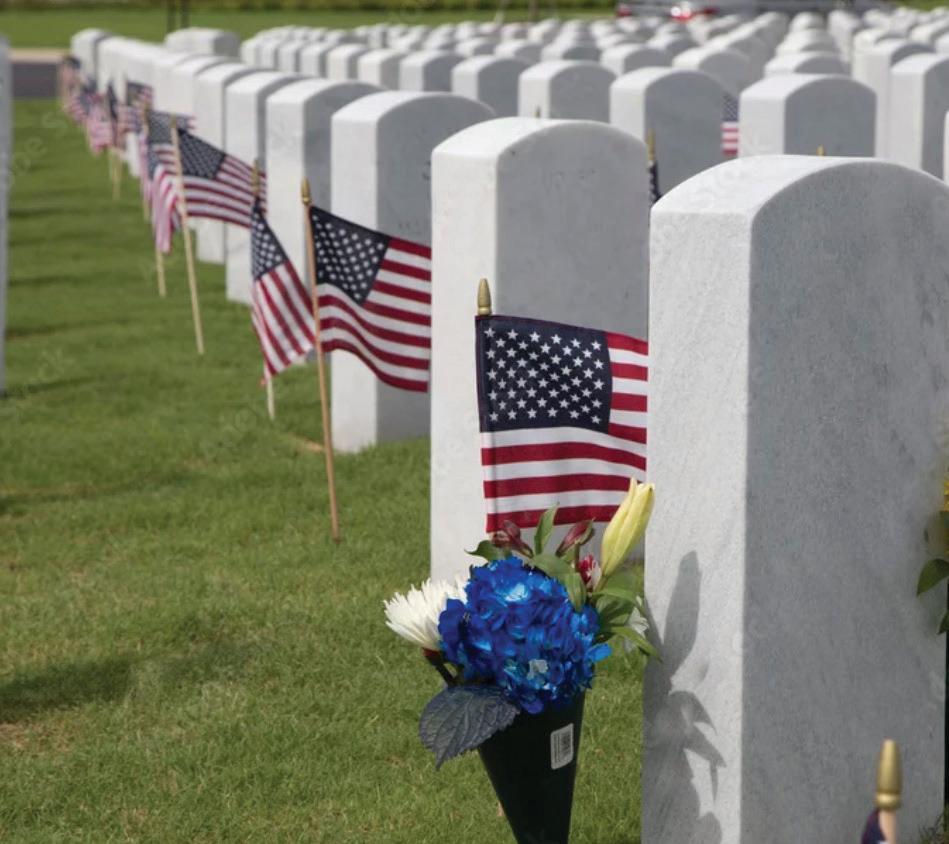
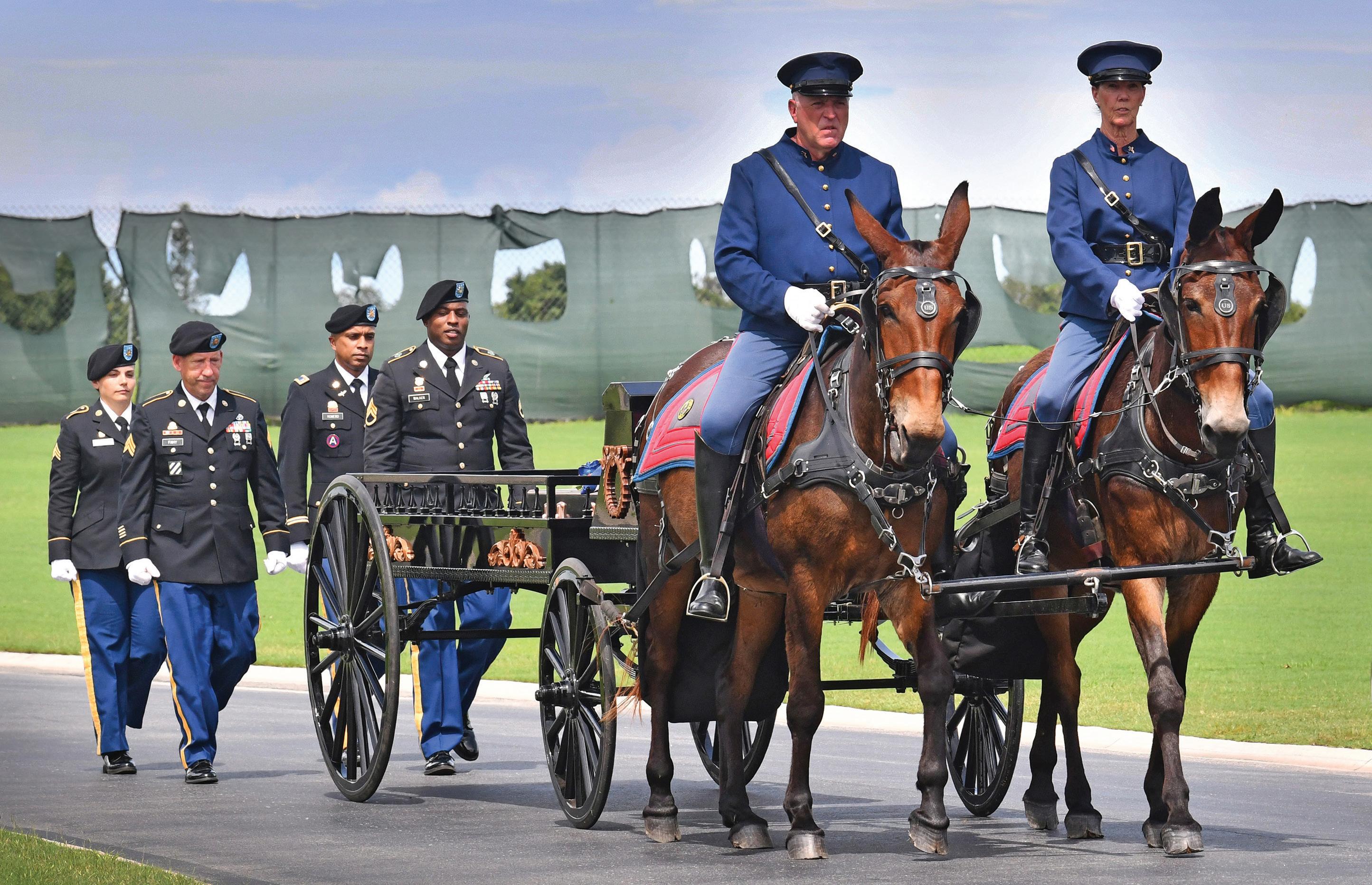
Denise Fitzgerald has spent her life in Florida, from growing up in Titusville to retiring as a crime scene investigator with the local police department. A lifelong horsewoman, Denise shares a deep passion for horsemanship and a strong sense of loyalty to veterans. Together with her husband Tom, she has dedicated herself to honoring those who served, blending her love of horses with a mission to give back to the military community through ceremonial caisson work and veteran tributes.
Denise, let’s start with a little background. Where were you born and raised?
I was born in Xenia, Ohio, but my family moved around a lot when I was young - Ohio, Michigan, New Jersey, Florida, Puerto Rico, and Germany - before I was ten. My dad was in civil service, so we were always on the move. Eventually, we settled in Florida, and I graduated high school here in Titusville. And you grew up mostly in Titusville? Yes, we moved to Titusville proper around 1965. I did spend a little time in Orlando, but for the most part, I grew up here. Fun fact - when I was in 10th grade, classes were half days because they were building Astronaut High School. We had class from 7:00am to 1:00pm, then Astronaut kids went from 1:30 to 5:30pm. That left plenty of time to get to the beach!
Tell us about your career.
I worked for the Titusville Police Department, and I was a crime scene investigator. I retired in 2012. After that, I’ve been spending time with horses and enjoying life. And how did you meet Tom?
We met right here at The Great Outdoors, over 25 years ago, during a Police Athletic League golf tournament. My friend and I were selling drinks to the golfers, and Tom was in a group playing that day. We were the Beer Babes and started talking during the barbecue afterward, exchanged numbers, and that was it. We always said, “We met at The Great Outdoors, and we’ll probably die at The Great Outdoors.”
And now, finally, you’ve made that move?
Yes! We just moved here six months ago. It’s been a long journey, but we’re home. TGO is our forever home.
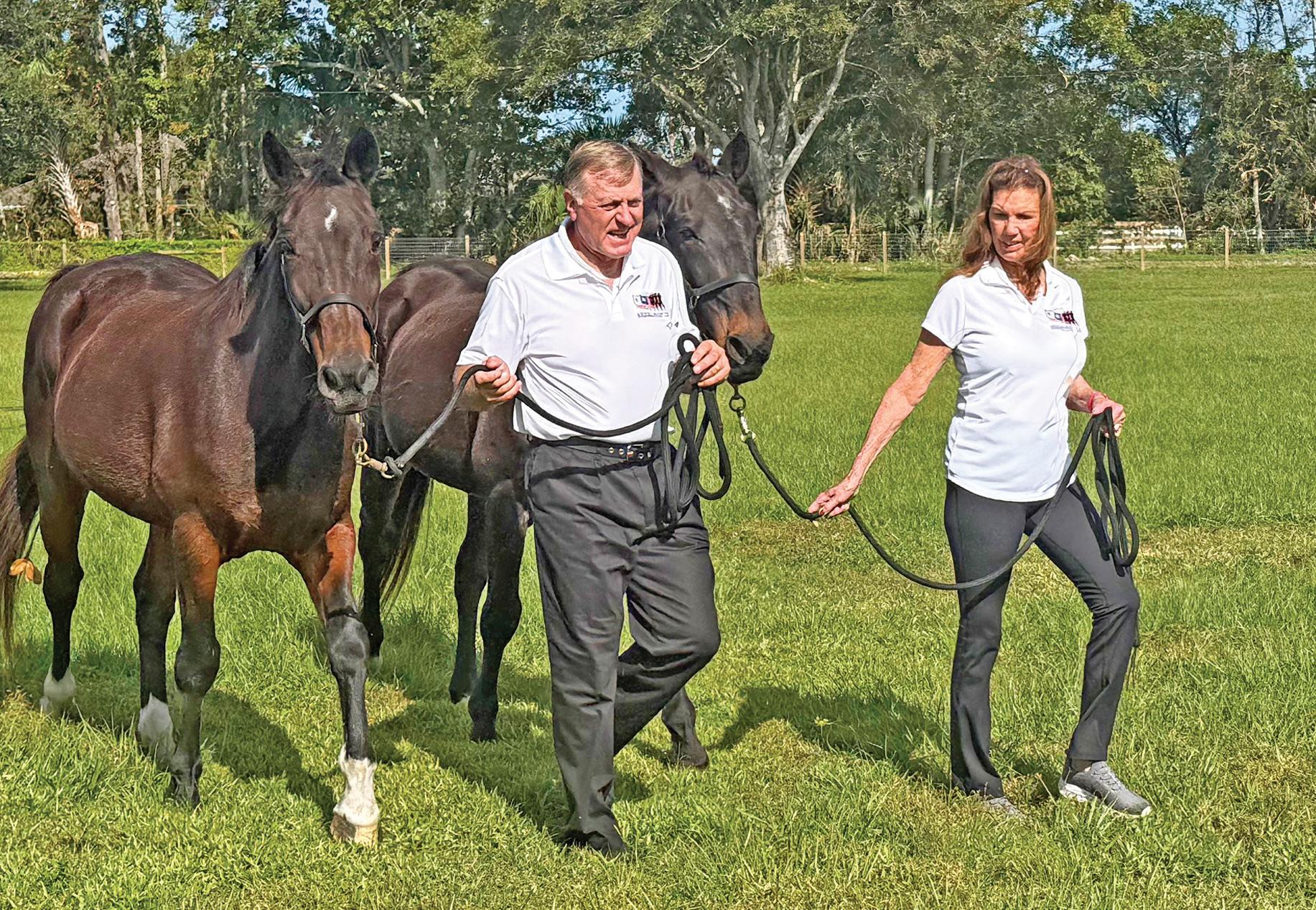
Tom Fitzgerald, known for his work with Solemn Pride and veteran tributes, is now pursuing a new mission: bringing equine therapy to veterans in Brevard County. With nearly 70,000 veterans living locally, he sees a critical need for programs that address both physical and mental health challenges, including PTSD, depression, and injuries sustained during service.
“Being around animals, especially horses, really fills your soul,” Tom says. “Programs like hypotherapy can help with muscle strength, coordination, and overall well-being. It’s not just physical - it gives veterans a mental break and a sense of purpose.”
Currently, Brevard has no VA-certified equine therapy facilities. The nearest programs are in Fort Pierce and St. Johns County. Tom is actively reaching out to local equestrian centers to create opportunities for veterans to ride, groom, or simply spend time with horses - making accommodations for those with mobility challenges.
By combining traditional therapy with the natural connection between humans and horses, Tom hopes to provide veterans with a unique, healing experience that addresses both body and mind. “Even just a few hours a month can make a huge difference,” he notes. “It’s about giving back to those who gave so much.”